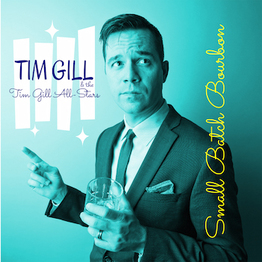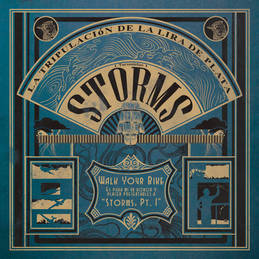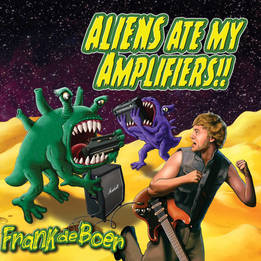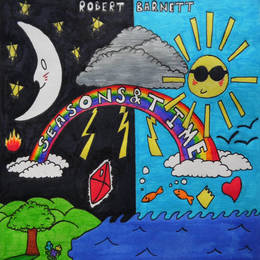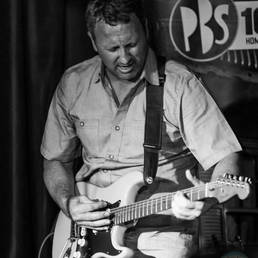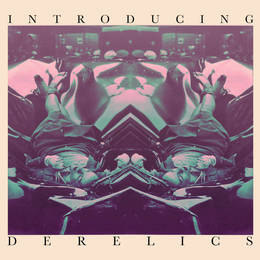|
Small Batch Bourbon by Tim Gill & The Tim Gill All-Stars is an excellent album of jazz standards with clever Nelson Riddle-ish arrangements, Rat Pack-esque vocals, and some Richard Cheese camp.
Gill is an agile vocalist and arranger and the All-Stars give excellent performances in support of every song. The title track is a humorous barrelhouse blues with Gill moving between Dean Martin-ish vocals both sung and spoken. There’s an exceptional piano solo in the middle. It features the pianist contrapuntally playing the boogie-woogie bass line while tearing it up in the right hand. Then the band rejoins. “A Foggy Day” has some smart saxophone arrangements and humorous band vocals. “Unchain My Heart” keeps the Latin groove from the Ray Charles original but adds some surf organ and prominent tambourine. There’s an excellent saxophone solo and some Maynard Ferguson-like high notes in the trumpet section. There’s a surprise salsa breakdown at the end with some soulful trombone soloing. “I’m Just A Lucky So-And-So” starts as a laid-back bluesy arrangement with a groovy piano bass line. Halfway through the song builds and soars with stacked horns and an alto saxophone solo. When the vocal comes back over triplet piano hits the song lives somewhere between the Rat Pack, Nat King Cole, and Ray Charles. “Benny’s Bugle” is a strong update of the Benny Goodman/Count Basie standard. Various muted trumpets/bugles duel against each other, calling and responding over a tight hi-hat groove and Dixieland drum fills. “You & The Night & The Music” is a cha-cha that is supported by congas and cowbells keeping steady time over drum fills. The trumpet solo weaves its way through clusters of backing horns and quarter-note triplets from the drums steadily opening up in tone and volume before making the hand-off to a screaming saxophone solo. “Hey Good-Lookin’” is an up-tempo number that closes the album and features a lively organ solo. Three of the songs feature delightful vocals from Adryon DeLeon. “L-O-V-E” starts with some more competition for Ferguson high notes in the trumpet before DeLeon takes over as if she is playfully bouncing the song from hand to hand. She also shines in “Comes Love” a tight bluesy number. “Let’s Call The Whole Thing Off” is a hammy exchange between Gill and DeLeon that is cute and funny with tight instrumental segues and a great final punch line. The album moves between humor and sincerity in a clever way. “I Won’t Dance” starts with a Richard Cheese-like sketch between Gill and the band before the song begins. The vocal is smooth and the band swings. There’s also a smart joke with the introduction of the drum solo. “You Must’ve Been A Beautiful Baby” begins with another band call-and-response and could easily move into schmaltz, but the vocal and quirky horn soli opens up the melodic content of the song. There’s another nice piano feature in the middle before some Louis Armstrong-like trumpet. The joke in “Pennies From Heaven” doesn’t quite work, but the band swings, the melody is good and there’s a strong trading off of solos before an excellent horn solo. Two particularly interesting moments on the album come in “Sunny” and “Arthouse Façade.” “Sunny” is an interesting update of the Bobby Hepp classic that opens with a bass feature and has some clever chromatic saxophone pads that descend and ascend behind the vocal. Though the arrangement doesn’t acknowledge the lyrical content, it does focus on the melody and is a smart instrumental arrangement. “Arthouse Façade” has a clever lyric and a stilted but interesting delivery in the arrangement that tips its hat to Charles Ives. Overall, the album is extremely well produced and performed. The vocals, horns and rhythm section all deliver strong performances, the songs are well chosen and sequenced, and it’s a very fun, energetic, and smart accessible listening experience.
0 Comments
I have very little information about the band St. Peter's Dog besides that it is made up of two guys from different towns. Matt lives in San Francisco, CA and Doug lives in Asheville, NC and they either sent files digitally or got together to release Hubcaps and Things. Hubcaps and Things which is a fifteen-song album that feels like it could fall apart at any moment (as if the album was alive and had ingested a bunch of Vicodin).
I say that in the best way possible in that the beauty of the album is that the songs never do fall apart. They are held together with guitar, banjos, subdued percussion elements and vocals that are delivered without a second thought. The vocals are essential to the lackadaisical vibe that is relaxing and makes you feel as if these guys don’t have a worry in the world. The other key to success is that the songs are well written despite sometimes feeling like skeletons. The duo put some thought into the structures and textures of these songs and it pays off. The song “San Juan” might remind you of the guitar riff in “Jane Says” by Jane’s Addiction. Other than that the song doesn’t have too much in common with Jane's Addiction. “San Juan” is loose and indicative of what else you can expect from this album. “Caroline James” is a certified highlight, which revolves around a rattle-ly acoustic guitar and a slide guitar. I was reminded of Beck’s One Foot in the Grave at times and thought the harmonica was a nice touch and the vocal line was exceptional. “Mighty Good People” sounds like a traditional country song sung in the backwoods of Tennessee. The mix of banjo and synth is an excellent combo that is soft and enticing. “Accidentally Drunk in Waynesville Again” may just be the best song on the album. The clinks and clacks from the percussion perfectly fit the band's style and I loved the delivery of the line “Accidentally Drunk in Waynesville Again.” As the album progresses they were a couple songs that stood out including “Tell It to the Gypsum Train,” “Big Baby” and the closer “Growing Old.” My only minor complaint about Hubcap and Things is that I think it would have benefited at a shorter track count. By the fifteenth track the album was getting a bit laborious and I felt ten to eleven tracks would have been more effective. Overall, Hubcap and Things is an original sounding album that mixes a number of different styles in a unique way.
Storms by Walk Your Bike is an ambitious concept album that tells a story inspired by Edgar Allen Poe complete with narration, different characters represented vocally and instrumental soundscapes that link sections together. There are parts of the album that work really well and others that slow the momentum of the album.
Musically, the album is generally very strong. The album opens with “A Scene” which has a minimalist ostinato synth pattern with various keyboards playing over it reminiscent of Jon Brion. The song transitions to live distorted guitars before dropping down for film noir-esque piano and strings. “The Silver Lyre” has some nice vocals singing alone and with some powerful harmonies over slide guitars and cellos. There is a Neko Case vibe going on in the pseudo-‘50s/’60s-Americana style of the song and also in the vocal phrasing. “Liquid” is a hard rocker with a strong full rock vocal. There’s some excited drumming with double kick drum, harmonized guitar lines and an interesting ska-breakdown towards the middle. Although not all of the hits line up together in the performance, there is certainly a lot of energy in this song and it’s the first time the album demands your attention. “Easy Breathing” is a smart mellow electronica song a la Sneaker Pimps with backwards cymbals, burbling tones, synthesized pianos and a powerful vocal. “Inspiration” moves from delicate acoustic guitar arpeggios supporting harmonized vocals to gritty electric guitars and rim clicks. There are some pretty moments, but when the voice moves to a solo voice there is a particularly beautiful quality that stands out from the harmonized sections. “Where Are We Going” is a bluesy minor number with some busy but florid harmony vocals throughout. Some of the weaker moments of the album include “Tales Of Aerth” which begins with west coast surf guitar before being joined by a spoken word verse that is occasionally doubled. Unfortunately in the chorus when the voice turns to singing, there are lots of words that are crammed into a small amount of space and the scansion feels awkward. It is followed by an excellent guitar solo, but closes with an abrupt shift to lounge jazz with Branford Marsalis-like soprano sax. It sounds good but it’s hard to see how it’s connected to what’s happened previously. “Nikola Tesla” has some squeaky acoustic guitar over some hurried bongos. The harmony vocal has some spirit to it, but the lead vocal has a disinterested blasé feel that doesn’t feel out of the genre of lo-fi indie folk, but loses some of the momentum that the album has built up so far. “Tesla’s Dream” starts with psychedelic guitar lines over a roadhouse blues band warming up before exploding into trippy acid rock. It dips into an echoed acoustic section before strings join in over sixteenth note hits on the hi-hat, which combined with the grungy guitar overpower the narration. “Mutiny” begins with a reggae guitar groove over some atonal cello lines. After the narration there are some faint vocals, which are mixed under the drums and cello and hard to pick out. There are some more spoken word bits that appear before more voices find their way to the top of the mix. The song descends into some messy bits with out of tune guitar and flailing drum hits. The transitions are abrupt and make it hard to justify the eight-minute length of the song. “Into The Mist” is a swirling 6/8 soundscape with waves, wind, piano and a stringed instrument that walks the edge of intonation and takes away the focus from some of the other elements. “Old Child Blues” is an electric blues out of the Jefferson Airplane playbook, but the vocal is a bit thin and clean to compete with the rest of the instruments and gets consumed in the dynamics occasionally losing some of the intended edge. “The Before, The During, The After” starts with some loud in-your-face guitar playing some flamenco like lines soaked in distortion while the rest of the band comes in and thrashes behind it. It’s a great instrumental though the mix puts the guitar so far in front of the rest of the instruments (and much louder than anything previously heard on the album) that it’s hard to appreciate the intricacies of the band. “A New View Of The Sky” falls into similar strengths and weaknesses; excellent melodic parts that interweave over each other but the mix is a bit overt. “Collision” on the other hand manages to achieve the same great sense of instrumental performance but with a tighter mix that connects the whole band together. Overall, it would be nice to hear some editing in the album, perhaps to break it down into shorter releases. It’s hard to follow the story and the narrator doesn’t command enough energy to keep interest in what’s going on. Still, instrumentally the album is very strong and there are some great performances that lend themselves well to soundtracks and soundscapes.
Nic Dyson is a twenty-one-year old singer/songwriter who is writing songs that feel perfectly fit for his age. He sings about the overwhelming emotions one feels at that age and how one might go about dealing with it. Dyson fits the classic singer/songwriter mold to a tee. On his latest album This One's For You he mixes together the ever-popular concoction of vocals, an acoustic guitar and melancholy in a relatively solid album of songs. Dyson has some innate talent and built a foundation forThis One's For You but it also contains a lot of common pitfalls and clichés you might expect from an artist this young.
One thing a lot of young songwriters tend to do is write music from a first person perspective. Let’s face it, people in their early twenties can be egocentric at times and some people never grow out of that phase. In Dyson’s case he seems to be innocently ignorant that keeping the lyrics focused on a singular perspective of his own feelings and troubles can ostracize listeners instead of creating empathy. Gifted lyricists like Sufjan Stevens and Bon Iver are able to weave in and out of perspective along with ambiguity and narrative to create musical experiences that make it feel like the songs aren’t so such much about them but about us. Dyson isn’t on that level yet but if anything has more in common with a young Conor Oberst who doesn’t use as many “big” words, analogies or metaphors. From a musical perspective Dyson is hit and miss. The songs revolve around basic chord progressions and fairly good singing. Dyson is at his best when he picks his guitar and smothers the songs in melancholy. The first notable track is “That Song” in which Dyson finds a good vocal range from his voice. It’s melancholy and nostalgic but probably could have benefitted from at least one major change in the song. Another song in a similar vein called “What Silence Said” benefits from female accompaniment while “Weather” might remind you of Iron & Wine. The pool is dense with competition in the melancholy, singer-songwriter department and Dyson has his work cut out for him if he hopes to be in the same league as some of the best in music today. That being said, Dyson is well rounded in singing, songwriting and guitar playing. A little bit of refining, tweaking and more life experience and I’m willing to bet Dyson’s best work lies ahead.
I can’t tell what Frank de Boer’s natural singing voice is like on his sophomore album Aliens Ate My Amplifiers. On his Bandcamp page he explains that he has a “versatile voice ranging from Buddy Holly to Johnny Cash and Cat Stevens and the style to match.” I can’t disagree. He sounds like the ghost of Johnny Cash on “Balls of Steel” but then occasionally sounds like Elvis on “Mediterranean View.”
As you can tell from the cover art and title of his album de Boer has a sense of humor. De Boer’s lyrics range from silly to absurd and sometimes both. Some of my personal favorites include, “Pigs are flying, the pelicans are buying And the world is a ball on its feet There‘s one slice of pie politicians are lying And divide it up to make us all sweet” and “We’re gonna build unfettered fireworks of such mythical proportions That if people bore witness, they would build a religion around it.” Kidding aside de Boers has some talent when it comes to songwriting. “A Higher Place” is a fun, upbeat song that is dynamic and creative. De Boers combines infectious melodies with silly, ambiguous and poignant lyrics that end of sounding like a cathartic church revival. Other songs like “Balls of Steel” are sparse acoustic guitar driven songs that as you may have guessed from the title can be humorous while “It Don’t Bother Me” is an instrumentally rich, upbeat song that is catchy and sing along worthy. De Boers also occasionally rocks out with a song like “Aliens Ate My Amplifiers” which contains a good amount of swing and electric guitar. Aliens Ate My Amplifiers might not be the most prolific album this year but it is a fun, well-produced ride that works on a number of different levels. Even though de Boers’ voice often mutates it somehow works and feels surprisingly consistent.
Last year Robert Barnett released Afterglow, which is an off-kilter album that revolved around acoustic guitar and his vocals. His most release Seasons & Time is very much a continuation of Afterglow with songs that feel like they were cut from the same cloth. Barnett’s strengths still lie in the inventive chord changes and technically proficient time transitions he pulls off.
Surprisingly, the first track “Daybreak” isn’t one of the stronger tracks on the EP. Barnett aggressively strums chord changes and even delivers a couple of notes that aren’t exactly flattering. All things considered it is a decent track but is far inferior to the haunting, melancholy opener on Afterglow entitled “Mid-Year Fall.” Luckily, Barnett implements some of the traits on “Hunter's Moon” that made his first EP unique and defined. The guitar picking is fantastic and he sings within his range. Barnett’s lyrics are poetic and poignant when he sings, “Playing cards with chance, And he has an ace. Pushing weights to breathe, Lifting life and death.” The next track “Jinx” is entirely instrumental and for those familiar with the album Behold The Spirit by William Tyler will hear similarities to the guitar playing. “Jinx” could have been shortened by about a minute or so but is still a solid track. “Open Road” is only a little over two-minutes long but is the arguable highlight. The guitar line is more engaging than the vocals on this track. Barnett pulls off impressive transitions with his guitar. If “Open Road” isn’t the highlight of the EP then “The Girl Who Played” is. It is a well-written track that plays into Barnett’s strengths when he sings, “When she got, Up to roll, On that day. Fate said that it would choke. Destiny woke, And had a word to say.” He closes with a solid instrumental track entitled “Charlotte” which is an emotionally resonant song that also happens to be technically impressive. I like the fact that Barnett hasn’t added additional instruments to the mix. He is one of the rare artists whose songs seem to be fine with very sparse instrumentation in the mix. Afterglow and Seasons & Time were recorded in close time space to each other, which is why I’ll repeat my sentiment from my first review. I have a feeling his best work is going to be ahead of him.
You Will Go To A Party Where Strange Customs Prevail by Pants & the Family is supposed to be a “Rock Opera” about three people the PREACHER, the PARTY GUY and the POOR GIRL—who meet and go to a party in a cornfield. At the party some sort of being fuses the three into a single person. If this information wasn’t on their Bandcamp page I wouldn’t have in a million years figured out that there was a narrative with these songs. There are no lyrics to be found anywhere and half the time I was desperately trying to understand what was being said. Suffice it to say precise narratives that demand your attention to the lyrics like this rarely work with albums and this is no exception. Even though the narrative is marginal at best the album has some other redeeming qualities. Those being that the band isn't afraid to get weird and most of the songs sound like a vacuous karaoke session that you overheard in the other room while coming off a bad acid trip.
Take for instance the first song “Lots of $ for Jesus, Not Much for Me.” The song is a dissonant pop song that has a wonky country vibe. I have no idea what the singer was saying. There were words I picked up like “cashew” and he sung about his mother and brother at points. I surmise this might have been an introduction to the Preacher character. The vocals on “Who Put the Holes in Mr. Wumpy?” have a Jim Morrison-esque bluesy vibe that gets mixed with flange-y synths and some decent funk bass. Towards the end of the song a female voice starts speaking and telling a story that makes about much sense as a David Lynch movie or the Eric Andre Show. “Uncle Charlie's Lap” has a decent groove and the band sounds like they are playing in the late night lounge in the seventh level of hell. The band gets sloppy - possibly on purpose - as the bass and organ start dancing around a myriad of notes. As the album progresses the novelty of the absurd starts to wear off by the time you reach the end but there are still some inspired moments. “You Will Go to a Party Where Strange Customs Prevail” is a seven-plus-minute psychedelic nightmare circus while “Why Drive When You Can Stay at Home” slowly ascends into apprehension. Pretentious, indulgent, creative, artistic and off the beaten path are all ways you can describe Pants & the Family. The band could be some kind of Ariel Pink, Flaming Lips hybrid if they get better at writing songs and improve the recording quality.
From the first sultry riff Wichita’s self-titled EP Wichita evokes an eerie and dark, yet energetic theme. Most of the first track is composed of a lonely electric guitar screaming out solos over simple percussion rhythms, and occasional gravelly vocals add to the mix. The band does not try to get fancy, instead landing on a catchy beat or riff and playing it out to full potential for a song. This can get repetitive and almost tedious to listen to continuously, but as background music this album makes for a great listen.
The style is predominantly classic rock and roll, with bits of blues, garage rock and progressive fusion thrown in for extra flavor. Harmonically, the band experiments with different minor chords and pentatonic motifs, especially at the beginning of “El Mariachi Perdido,” the second song of the EP, which sounds likes a foreboding Spanish/cowboy band. All of the songs on the EP are rather lengthy, running from five minutes to over nine minutes long, and this is probably because most of the songs were results of jam sessions that the trio had together. A lack of vocal harmony in most of the album contributes to a simple, uncomplicated sound that one might expect from a live band. In fact, the entire EP sounds like a recorded jam session, albeit a professional one with no mistakes. The EP contains no surprises until the last track “Forgotten Places.” For this song, typical distorted electric guitar and bass are replaced with a smooth electric guitar vamping and percussive accompaniment to a bright piano. The piano has a good amount of reverb attached to it, as do the other instruments, so this song, an instrumental song, feels heavy and reflective. As a whole, the album is a good starting point for a rock and roll band, but future projects would benefit from more variety, more instrumentation and a bit faster tempo.
Become A Fan
20th Century music, it seems, was intent on breaking down rules and regulations, as any kind of cohesive cultural narrative atomized into a postmodern nuclear meltdown. It was all about hyper-specialized niches and genres, each of which attracted their own following, developing their own cultural mores and aesthetic rules, which had to be followed to the letter or else be shunned. What resulted was a kind of music in breeding that tended to emphasize the generic trappings of a genre, both its strengths and weaknesses.
Here, now, 15 years into the 21st Century, it seems this motion is being reversed with many musical tributaries flowing together, coming back into a kind of inclusivity that, while bad for the purists, is good news for the music and for the intended reach. On Black And Blue Latitudes, Gothenburg, Sweden's Eyemouth bring together elements of post-rock, electronica, folk and goth, to stunning effect, in an attempt to approximate the ground we walk on with its various strata of meaning. For anyone that follows any of those genres, this is great news, worthy of heralding to the skies, as each style has succumbed to almost a form of self-parody in their purest forms. Electronic music becomes generic club anthems. Post rock being bloated and pompous bands with long names following the same template Mogwai mastered before the turn of the century, and goth, well... goth can get pretty cheesy, with its mock witchy ceremonial vocals. Eyemouth takes the best parts of each and sculpts a truly exceptional document, the first of four EPs, all meant to portray the sound of soil, nature, and the Earth, using a unique blend of folk instruments, such as accordion and atmospheric psychedelic rock instrumentation with some electronic flourishes, like echo and delay, which gives the feeling of distance and reverie. All in all, Black And Blue Latitudes is the sound of exploring some idyllic, unknown forest glade, digging through the underbrush, looking for treasures, exploring the microfauna. This is so much more interesting that the generic production music of "Drum And Bass @ 135 bpm" that makes up mainstream electronic music. And major bonus points for revitalizing goth rock, a style that has not been at its peak since the early ‘80s. Magical stuff. Take a trip!
Derelics began after guitarist and lead singer Reno moved to London to find what he referred to as the “Holy Grail” of musicians. Reno had been trying for years to put a band together in Paris, but to no avail. In London, Reno set out on his search for a drummer and a bass player. He found a drummer named Rich. Still without a bass player the duo, who since their meeting had become better musically acquainted, decided to record sans bass player. The fruits of this recording resulted in their debut three- song EP Introducing, which was recorded with famed metal producer Gomez Arellano, at Orgone Studios in North London.
Derelics stomp their way through the six-plus-minute sludge metal opener “To Brunehilde” which may refer to the fabled princess turned Valkyrie from Icelandic and German mythology. The duo maximizes their sound with multiple layers of fuzzy feedback and reverberating bass drum. Here the pair also showcase their ear for melodic construction as “To Brunehilde” suddenly quiets for a few minutes in the middle and takes a turn full of wispy vocals with backing ah’s and drum circle-like breakdown beats. From here the song slowly and carefully builds up again until it reaches a hazy zenith of dirty, raunchy rock. By contrast, “California” with its classic metal motif opening where Reno sings a few bars a cappella before the song launches, displays a softer and more groovy rock side to it, much like a Soundgarden ballad, which as long as the reference is out there, Reno’s vocals have that same “man in pain” cry Chris Cornell has. As “California” slowly lurches along, its sound structure becomes as diverse as the state for which it is named. Over its six-minute stretch “California” exhibits influences of everything from grunge to post-rock, and straight up heavy metal. Fans of metal with longer attention spans than my own will likely find this to be a good track to get lost in though I found it a little too long for my taste. Derelics definitely won my heart back with their raucous stomp-metal closer “Ride the Fuckin’ Snake to Valhalla,” an eight-plus-minute all-out metal assault of long hair shaking head banging rock. There seems to be a bit of campiness to Derelics, from their moniker to their song titles. But the music is true to form. It seems they play the genre card well as most metal bands and really don’t stray from the direction of loud guitars, drums and screaming. As a genre, heavy metal never wowed me. But it is a genre I have come to have great respect for. I would recommend Introducing to anyone who has been a metal head their whole lives, or those like me, who enjoy a little something different from time to time. |
Critique/insightWe are dedicated to informing the public about the different types of independent music that is available for your listening pleasure as well as giving the artist a professional critique from a seasoned music geek. We critique a wide variety of niche genres like experimental, IDM, electronic, ambient, shoegaze and much more.
Are you one of our faithful visitors who enjoys our website? Like us on Facebook
Archives
July 2024
|

